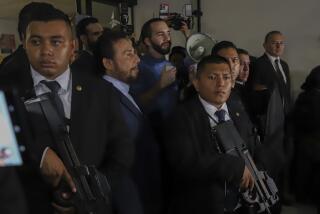The Uribe problem
- Share via
President Alvaro Uribe of Colombia is possibly the most popular elected leader in the world. The military’s dazzling rescue of hostages held for years by leftist rebels, including Franco-Colombian politician Ingrid Betancourt and three American military contractors, coupled with his successful attacks on the guerrillas’ drug trafficking, have led to approval ratings of which most politicians only dream: On a bad day, support for the president dips below 90%. Kidnappings and murders, although still astronomically high by U.S. standards, are at their lowest levels in 30 years, and Colombians finally are optimistic about an end to their decades-long civil war.
Now, Uribe’s supporters are urging him to seek a third term; they have amassed 5 million petition signatures, enough to begin the process of amending the Constitution to permit him to run in 2010. Uribe himself has been quiet on the subject, but it’s time for him to speak out and say: No, thank you. Colombia’s Constitution already was amended to allow Uribe to seek a second term in 2006 -- the legitimacy of which is now being questioned by the Supreme Court. Another such effort casts doubt on the president’s commitment to democracy, sliding him into the same unsavory category as Hugo Chavez, who makes no secret of longing to be Venezuela’s president in perpetuity.
Progress against leftist rebels should not be the sole measure of Uribe’s tenure. Also crucial is his ability to strengthen the governing institutions on which Colombia’s struggling democracy depends. For all its improvement, the country is still rife with corruption and violence, and the Revolutionary Armed Forces of Colombia is not the only culprit; almost a third of the Congress, including members allied with the president, is either in jail or under investigation for links to right-wing death squads and/or narco-traffickers. Uribe’s proposal to strip the Supreme Court of its power to investigate Congress only exacerbates the sense that he and his supporters intend to subvert the democratic process. We applauded Uribe for not attempting to sway the court when it indicted his cousin, former Sen. Mario Uribe, hopeful that it was a sign of a maturing democracy.
Even without running again, Alvaro Uribe can have enormous influence in shaping the future of Colombia. Anyone he anoints as his successor is almost guaranteed to win. Also, the Constitution permits another Uribe candidacy in 2014. Should the drive to amend the Constitution move ahead, it must survive four debates in Congress and a review by the courts before a referendum could be held. But Uribe can stop this process now, and choose to strengthen Colombia’s democracy by standing aside.
More to Read
Sign up for Essential California
The most important California stories and recommendations in your inbox every morning.
You may occasionally receive promotional content from the Los Angeles Times.










